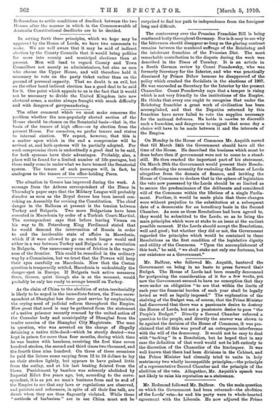Mr. Balfour, who followed Mr. Asquith, bantered the Government on
being in no haste to press forward their Budget. The House of Lords had been roundly denounced for postponing the consideration of it for a few weeks, yet now the Government seemed to have no conception that they were under an obligation " to see that within the limits of each year the financial burden of each year shall be legally levied as well as legally imposed." The explanation of the shelving of the Budget was, of course, that the Prime Minister had discovered that there was a passionate desire to destroy the House of Lords, but not a passionate desire to pass "the People's Budget." Directly a Second Chamber referred a question to the people, and directly the answer was shown to be against the decision of the House of Commons, it was pro- claimed that all this was proof of an outrageous interference with the will of the democracy. It would not be easy to deal with "tacking " in a Resolution, but he hoped that in any case the definition of that word would not be left entirely to the discretion of the Chancellor of the Exchequer. It was well known that there had been divisions in the Cabinet, and the Prime Minister had clumsily tried to unite in holy matrimony two wholly incompatible principles,—the principle of a representative Second Chamber and the principle of the abolition of the veto. Altogether, Mr. Asquith's speech was not likely to raise his reputation as a statesman.














































 Previous page
Previous page